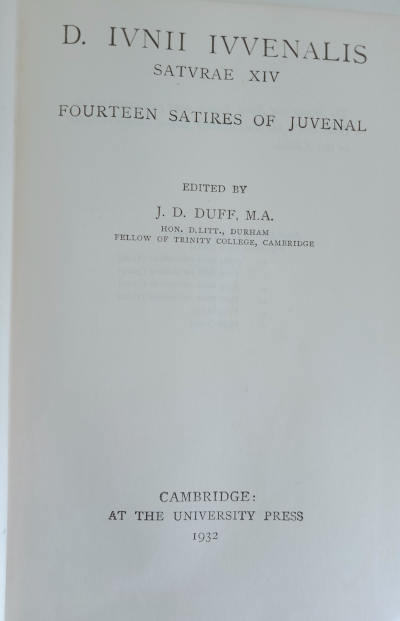About the Satires (from Wikipedia):
Juvenal’s 16 satiric poems deal mainly with life in Rome under the much-dreaded emperor Domitian and his more humane successors Nerva (96–98), Trajan (98–117), and Hadrian (117–138). They were published at intervals in five separate books. Book One, containing Satires 1–5, views in retrospect the horrors of Domitian’s tyrannical reign and was issued between 100 and 110. (The historian Tacitus, a contemporary of Juvenal, was also embittered by the suspicion and fear of that epoch.) Book Two, the single, enormous Satire 6, contains topical references to the year 115. The third Book, with Satires 7, 8, and 9, opens with praise of an emperor—surely Hadrian, who endowed a literary institute to assist deserving authors—whose generosity makes him the sole hope of literature. There is no datable allusion in Book Four, which comprises Satires 10–12. Book Five, made up of Satires 13, 14, 15, and 16, has two clear references to the year 127.
The Satires attack two main themes: the corruption of society in the city of Rome and the follies and brutalities of mankind. In the first Satire, Juvenal declares that vice, crime, and the misuse of wealth have reached such a peak that it is impossible not to write satire, but that, since it is dangerous to attack powerful men in their lifetime, he will take his examples from the dead. He does not maintain this principle, for sometimes he mentions living contemporaries; but it provides a useful insurance policy against retaliation, and it implies that Rome has been evil for many generations. Male homosexuals are derided in two poems: passives in Satire 2, actives and passives together in Satire 9. In the third Satire a friend of Juvenal explains why, abandoning the humiliating life of a dependent, he is determined to live in a quiet country town and leave crowded and uncomfortable Rome, which has been ruined by Greeks and other foreign immigrants; while in the fifth Juvenal mocks another such dependent by describing the calculated insults he must endure on the rare occasions when his patron invites him to dinner. The fourth relates how Domitian summoned his cringing Cabinet to consider an absurdly petty problem: how to cook a turbot too large for any ordinary pan.




